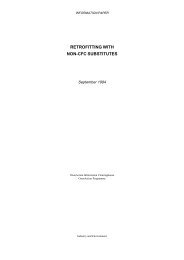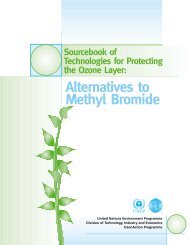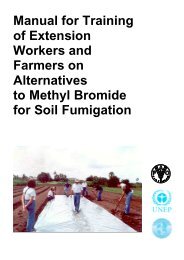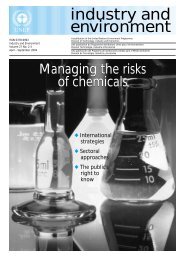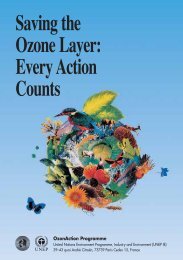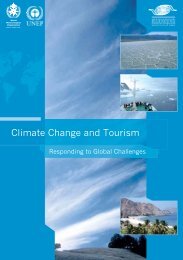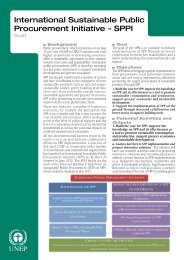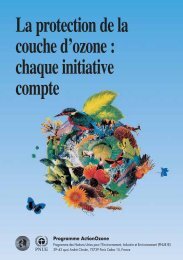Mining and Sustainable Development II - DTIE
Mining and Sustainable Development II - DTIE
Mining and Sustainable Development II - DTIE
Create successful ePaper yourself
Turn your PDF publications into a flip-book with our unique Google optimized e-Paper software.
<strong>Mining</strong><br />
Social issues<br />
<strong>Mining</strong> <strong>and</strong> the social imperative<br />
Nola-Kate Seymoar, President <strong>and</strong> CEO, The International Centre for <strong>Sustainable</strong> Cities (ICSC), Suite 901, 1090 West Georgia St.,<br />
Vancouver BC V6E 3V7, Canada<br />
Abstract<br />
Most mining executives are geologists or engineers, male <strong>and</strong> over 50. They can relate on some<br />
level to environmental scientists or technologists, but they are ill equipped to underst<strong>and</strong> social<br />
scientists, community workers <strong>and</strong> community activists whose focus is on cultural <strong>and</strong> relational<br />
issues. Yet, increasingly it is the community groups <strong>and</strong> social activists that determine<br />
whether or not the company obtains its permits <strong>and</strong>/or tax <strong>and</strong> other concessions from national<br />
<strong>and</strong> local governments. And it is those same community groups, indigenous tribes <strong>and</strong><br />
NGOs that can affect a company’s image <strong>and</strong> stock prices worldwide. Uncomfortable though<br />
it may be, mining executives, government officials, NGOs <strong>and</strong> community leaders are finding<br />
themselves forced to work together.<br />
Résumé<br />
La plupart des cadres de l’industrie minière sont des géologues ou des ingénieurs de sexe masculin,<br />
âgés de plus de 50 ans. S’ils peuvent s’entendre à un certain niveau avec des chercheurs<br />
ou des techniciens de l’environnement, ils sont par contre mal équipés pour comprendre les<br />
chercheurs en sociologie, les travailleurs sociaux et les militants sociaux, principalement préoccupés<br />
par des questions culturelles et relationnelles. Pourtant, ce sont de plus en plus les<br />
groupes et les militants sociaux qui déterminent si une entreprise obtiendra des autorités<br />
nationales ou locales les autorisations nécessaires et/ou des dégrèvements fiscaux et autres. Et<br />
ce sont ces mêmes groupes, tribus indigènes et ONG qui peuvent remettre en cause l’image de<br />
marque d’une entreprise et avoir un effet sur le prix des actions dans le monde entier. Malgré<br />
toutes les difficultés que cela peut poser, les cadres de l’industrie minière, les représentants des<br />
gouvernements, les ONG et les animateurs de communauté sont bien obligés de travailler<br />
ensemble.<br />
Resumen<br />
La mayoría de los ejecituvos mineros son geologos o ingenieros, de sexo masculino y mayores<br />
de cincuenta años. Están capacitados para relacionarse hasta cierto punto con científicos o<br />
técnicos ambientales, pero no están preparados para comprender a los científicos sociales,<br />
trabajadores comunitarios y activistas comunitarios que se centran en aspectos culturales o<br />
relacionales. Sin embargo, los grupos comunitarios y los activistas sociales son quienes determinan<br />
cada vez más si la compañía obtiene o no sus licencias y/o excenciones impositivas u<br />
otras concesiones por parte de los gobiernos nacionales o locales. Y son esos mismos grupos<br />
comunitarios, tribus indígenas y ONG’s los que pueden modificar la imagen de la empresa y<br />
los precios de las acciones alrededor del mundo. Por incómodo que resulte, los ejecutivos<br />
mineros, funcionarios de gobierno, ONG’s y líderes comunitarios se ven obligados a trabajar<br />
en conjunto.<br />
At ICSC we define sustainable development<br />
as development that enhances the economic,<br />
social <strong>and</strong> ecological well-being of current<br />
<strong>and</strong> future generations. John Robinson <strong>and</strong><br />
his colleagues at the <strong>Sustainable</strong> <strong>Development</strong><br />
Research Institute (SDRI) refer to it as an integration<br />
of economic, social <strong>and</strong> ecological imperatives.<br />
When it comes to mining issues, I am more<br />
inclined to SDRI’s definition. What is emerging<br />
in the field is a sense of imperative that goes<br />
beyond a desire to enhance well-being. Companies<br />
cannot afford to invest in a mine unless they<br />
are assured of a secure economic return over many<br />
years, <strong>and</strong> that in turn is more <strong>and</strong> more dependent<br />
upon their ability to take environmental<br />
impacts into account. This reality has been part of<br />
the mining scene for the past decade. A review of<br />
annual reports of the progressive <strong>and</strong> largest mining<br />
companies shows that environmental impact<br />
assessments have become a fact of life <strong>and</strong> considerable<br />
effort is put into mitigating the negative<br />
impacts of mining activities. Some mining executives<br />
argue that environmental science <strong>and</strong> technology<br />
has become mainstream in their<br />
companies.<br />
It is often these same executives who see the<br />
emergence of social issues as by far the most difficult<br />
part of the sustainability triangle. They point<br />
with some trepidation to the complexity of relations<br />
with communities, indigenous tribes <strong>and</strong><br />
with NGOs at both the local <strong>and</strong> international<br />
level. Most mining executives are geologists or<br />
engineers, male <strong>and</strong> over 50. They can relate on<br />
some level to environmental scientists or technologists,<br />
but they are ill equipped to underst<strong>and</strong><br />
social scientists or community workers whose<br />
focus is on cultural <strong>and</strong> relational issues (<strong>and</strong><br />
whom, they can’t help but notice, are often<br />
women). Nor are they comfortable relating to<br />
community activists whom they perceive as operating<br />
from an emotional base without sufficient<br />
access to the facts. Yet, increasingly it is the community<br />
groups <strong>and</strong> social activists that determine<br />
whether or not the company obtains its permits<br />
<strong>and</strong>/or tax <strong>and</strong> other concessions from national<br />
<strong>and</strong> local governments. And it is those same community<br />
groups, indigenous tribes <strong>and</strong> NGOs that<br />
can affect a company’s image <strong>and</strong> stock prices<br />
worldwide. Uncomfortable though it may be,<br />
mining executives, government officials, NGOs<br />
<strong>and</strong> community leaders are finding themselves<br />
forced to work together.<br />
A survey conducted by Dr. Allen Clark, of the<br />
East-West Centre in Honolulu, presented in the<br />
World Bank Conference on <strong>Mining</strong> <strong>and</strong> the<br />
Community in 1997, identified l<strong>and</strong> access <strong>and</strong><br />
UNEP Industry <strong>and</strong> Environment – Special issue 2000 ◆ 57



